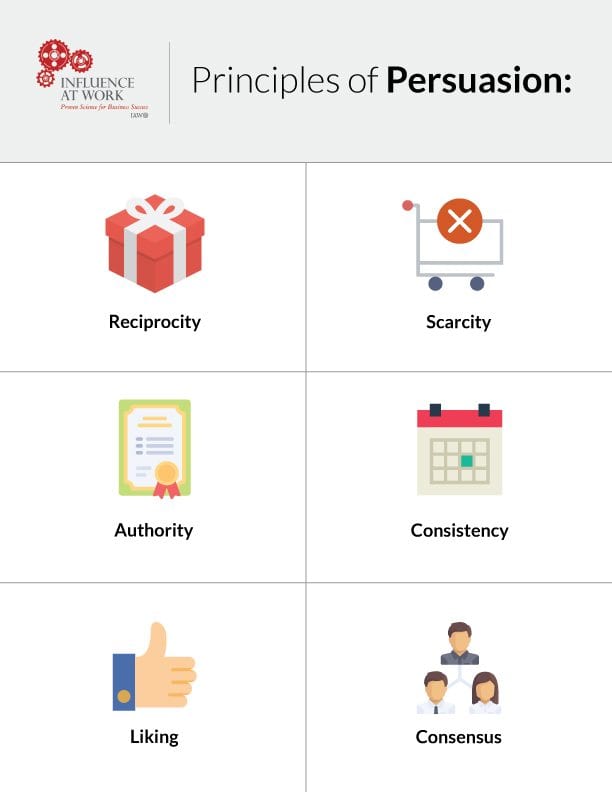Traditional marketing took off in the early 20th century as a result of mass production. With products now being created in bulk, marketing was needed to get them in front of consumers and get them off the shelves, quickly. By the 1950s marketing had become a well-recognised part of mainstream media, the result of which was that scientists and psychologists began to study in detail the links between marketing and psychology.
Over the years, the marketing industry continued to grow (and it is now estimated to be worth around 1.7 trillion dollars). Then, the invention of new technologies meant that the marketing industry had to adapt and digital marketing has now become the primary strategy for many businesses across the globe.
Though the marketing techniques and platforms may have changed over the years, much of the psychology around marketing still remains the same and can therefore be applied to both online and offline strategies. And with the growing popularity of platforms like social media, more studies are always being conducted to help marketers keep on top of the latest trends.
As these studies have become more detailed and marketing has become more competitive, understanding the psychology behind it has become critical to understanding consumer behaviour. This is important for being able to target consumers in the most effective way to generate the most sales. Especially given the huge amount of information and images we are bombarded with each day through our phones, TVs, laptops etc.
But hang on, if marketing and psychology have been linked for so long, why are we focusing on this now? Well, SEO is an important part of online marketing and many businesses invest huge amounts of time and money into their strategy. Despite this, the SEO industry is a bit behind on understanding the important role psychology plays on the SEO landscape.
This could be because SEO is already complex enough and there is so much going on in the industry. However, to achieve the best results and to rank as highly as possible, it is so important to consider the psychology behind this type of marketing and how it impacts consumer behaviour.
That’s why we’ve put together this guide, Below, we’re going to look at the role psychology plays in SEO and how you can apply this to your own strategy. To do this, we’re going to address the following chapters:
- What is marketing psychology and why is it important?
- The role of psychology in decision-making
- The importance of combining SEO with psychological principles of persuasion
- The role of psychology in SEO for consumers and industry professionals
- In summary
What is marketing psychology and why is it important?
Marketing psychology is about understanding the decision-making process and the cognitive biases of consumers. Once you understand this, you can better anticipate the behaviour and actions of buyers. You can then apply this knowledge to your marketing techniques, content, adverts and campaigns.
Understanding the behaviour of consumers and what drives their purchasing choices (e.g personalised experiences, trust, brand loyalty and ease) is important as this can impact how and where you target them and the customer experience that your company offers.
The role of psychology in decision-making
Though we might like to think we’re all very logical people and in control of our minds, this isn’t always the case. More often than not, our decisions are made unconsciously, those small things we do every day that we might not even think about. Even those big decisions where you spend days weighing up the pros and cons are not always made logically. Over the years, research has shown that most of our decisions involve emotion and unconscious bias that we might not even know we have.
Because of this, marketers have had to get to grips with the psychology behind decision-making if they hope to understand what it is that drives consumer behaviour and how they can use this to manipulate buyer actions.
Research from Erik du Plessis found that “likability” is one of the biggest keys to persuading people and as such, adverts must tick all the right boxes, they must be entertaining, relevant and empathetic without being confusing or alienating.

These underlying psychological motivators are driven by the emotional part of the brain, the amygdala. And Plessis also found that fear, envy, and excitement can also drive consumer behaviours. Other things that affect the way consumers act are ‘herding’ and ‘decision paralysis’ when faced with too many options. Taking all of this into account, marketers are able to create campaigns, adverts, commercials and content that can influence and manipulate consumers to make their desired actions.
Why is this important for SEO?
So what has all of this got to do with SEO and why are we telling you this? A lot of aspects of SEO rely on algorithms (such as that of Google) but these rational algorithms don’t always accurately reflect how people make decisions because as we’ve said, decision-making often isn’t a rational action. So by understanding how psychology and emotion impacts decision-making, brands can tailor their content to appeal to both the rational and emotional sides of its audience.
When you think about it, search results pages show thousands of listings all battling to be centre of attention – sometimes all within the four to five inches of a smartphone screen. So knowing what makes your target audience tick emotionally and being able to appeal to their rational side as well, can be the difference between an impression and a click-through to your website. And the quality and quantity of your website traffic can have an impact on your rankings.
Another example of this is whether people choose to click through to your website from a link or an advert. They make the conscious decision to do this, so in order to drive more click-throughs, your content needs to appeal to their emotions and offer them something valuable and relevant. This can be enough to trigger an almost unconscious action of clicking through to your site or land pages.

The importance of combining SEO with psychological principles of persuasion
We’ve touched on decision-making and the importance of understanding consumer behaviour in order to apply this to your SEO strategy, but it’s also vital that we look at the principles of persuasion as a way of influencing consumer behaviour as well. Dr Robert Cialdini wrote about the 6 principles of persuasion. When applied to marketing, these are:
- Reciprocity – considering that people are more likely to do something for you if you do something for them
- Affinity – people like brands that have similar values to them (for example sustainability) and are therefore more likely to trust these brands
- Authority – people are more likely to listen to brands or individuals that have a good reputation
- Social proof – people tend to follow herd mentality and they trust their peers, therefore they’re more likely to do something if others have recommended it or done it before them
- Scarcity – everyone loves something that is unique or limited edition and will therefore place higher value to it
- Commitment – people are more likely to commit to you in the future if you can get them to make a smaller commitment initially

Source: https://www.influenceatwork.com/principles-of-persuasion/
Marketers are able to leverage these principles to target their audience and influence consumer behaviour. It’s also vital that you have these principles in the forefront of your mind when putting together your SEO strategy, allowing them to influence your content, keyword research and how you plan to optimise your website. In the next chapter, we’ll look in more detail at how these principles can be applied to SEO and how they can further impact the decision-making process.
The role of psychology in SEO for consumers and industry professionals
The relationship between psychology, consumer behaviour and search marketing is important for SEO professionals. We’ve already touched on how decision-making and persuasion are important factors for creating content that converts (and ranks) and in this next section we’ll look in more detail at other ways psychology impacts on SEO.
In today’s competitive landscape, it is so vital that businesses understand the motivations and driving forces behind why users search the things they do, why they click through to certain sites or blog posts and reply to certain outreach emails and not others, and what their motivations and reasons are behind making certain purchases.
By understanding the role psychology plays on consumers, you can understand how to use this to influence your SEO for the best results. You can also ensure you deliver the best possible user expense on your site and landing page. Below, we’ll look at some of the biggest roles that psychology plays in SEO and how effective these can be.
Incentivising for SEO
One of the key principles of persuasion that we discussed earlier was reciprocity. Generally, people are programmed to choose incentives and are more likely to take action if it will benefit them in some way. For industry professionals, this psychology can be applied when link building. If you promote somebody and include a link to them on your site or social media, they are more likely to return the favour. But this doesn’t always have to be a link for a link, any action of equal value will be well received.
In terms of consumers, this principle applies to your messaging. By carefully choosing your messaging to show the benefits of your product or service, you incentivise the consumer to make the desired action, be that to click through to your site, sign up to your newsletter or make a purchase. Some examples of this could include:
- By signing up to our newsletter you’ll receive exclusive discounts – you’re giving them a chance to save money
- By choosing our product, 10% of the proceeds will be donated to our chosen charity – you’re matching their values and playing on their emotional need to help others
- By choosing our product you’ll be putting your health first – you’re playing on their emotional need to look after themselves and take care of their body
So as you can see from these examples, by carefully choosing your language you can drive more quality traffic through to your website, as well as persuading them to complete other desired actions such as making a purchase.
Combating decision paralysis through CTAs
By understanding that too much choice can cause decision paralysis, you can make sure that your content, be that your blog posts, adverts or social media posts, limit the amount of CTAs used. Too many calls to actions on one webpage can cause decision paralysis and actually have to opposite effect, causing the user to abandon your page more quickly and without taking action. This isn’t good for your bounce rate and as a result, your SEO.
 Source: https://icons8.com
Source: https://icons8.com
Creating authority
Authority is hugely important for SEO and for driving customers to your website. As we said earlier, people are more likely to trust brands that have a good reputation, so are search engines like Google. By understanding this need for authority on both parts, you can ensure that your content links to trustworthy sites and that all information within is valid, proven and comes from a place of authority. This will help to boost your rankings and position your brand as an industry leader.
Providing social proof
Social proof and herd mentality plays a big part in the psychology of decision-making. People value the opinions of their peers and the feedback of others. As such, SEO professionals should utilise this knowledge by making use of social proof such as sharing testimonials on landing pages or social media. These can be slightly amended to include keywords where necessary.
Uncovering intent
And last but certainly not least, an important part of SEO has always been offering real value and creating content that is of genuine interest to the target audience. Psychology helps us to better understand not only what the audience is searching for, but why they’re doing this and what they’re hoping to achieve.
Uncovering intent is the key to creating killer content that converts and believe it or not there’s a lot of psychology behind this. Search engines already have to do this, they need to be able to use keywords to understand what queries a user is running and which content is going to be most relevant to them.

Source: contentmarketinginstitute.com
This is done through algorithms of course, but by ensuring that you’re answering their questions or showing them products that solve their problems, you are more likely to achieve the desired reaction. This is also why keyword research is so important, so that Google is able to find and show your content in order to answer a user query.
In summary
Understanding the psychology behind consumer behaviour is vital for being able to anticipate their needs, create relevant content and understand how they make decisions. More and more, SEOs are getting to grips with this idea and the many principles we looked at above. This is a key concept in the ability to create an SEO strategy that generates a measurable return on investment.




